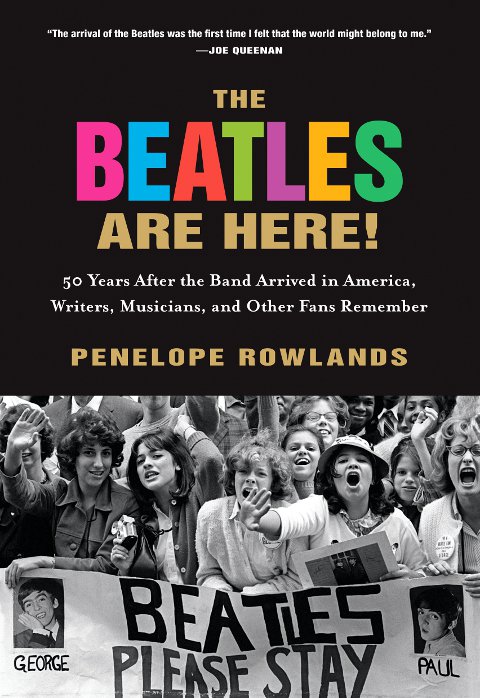The Beatles arrived in America on Feb. 7, 1964. As their plane taxied on the runway at the recently renamed JFK airport, it was reported that teen idols like Pat Boone, Frankie Avalon and even Elvis Presley disappeared into another dimension; those folks wouldn’t be heard from again until Yoko pulled the plug on the show five years later—and then only as shadows of their former selves.Penelope Rowlands delves into the phenomenon of Beatlemania in the USA in a collection of essays and anecdotes from writers, musicians and fans in The Beatles Are Here!: 50 Years after the Band Arrived in America, Writers, Musicians & Other Fans Remember. As Rowlands reminds readers in the intro, the Fab Four’s arrival and their recordings “seemed to render almost everything, musically, that came before it obsolete.” Über-critic Greil Marcus resonates among cataloged voices, declaring that “Meet the Beatles” was “the spookiest stuff I’d ever heard—particularly ‘Don’t Bother Me,’ the George Harrison song.” Harrison’s signature sound was practically unheard of in the before-time. After reading this book, I discussed Harrison’s sound with solo recording artist Caleb Miles (A Murder of Crows, The Illegal Aliens, F.O.R.). Miles said Harrison’s style was innovative because it made use of the instrument he chose, a Gretsch, in a rarefied way. “When you listen to these early solos, you don’t hear much bendy stuff: It’s all slurs,” said Miles. Something in those slick and sour intervals between notes drove kids to mania because it was, finally, new.Fashion designer Vicki Tiel’s contribution to Rowland’s collection recalls the Greenwich Village folk scene at the time: Besides Dylan, “Nobody had anything new,” wrote Tiel. Utterly flummoxed by a recording of “She Loves You,” her folk-singer boyfriend jumped from her bed—coitus interruptus!—to scream “Nobody fucking does that!” Before leaving town, her folksy beau expressed dread, saying, “It’s finished. It’s over. It’s over for all of us.”And so it goes. Rowlands’ tome is loaded with testimony of the emotional gravity of The Beatles’ accession—how the gesture of their advent and first performance on “The Ed Sullivan Show” catalyzed a cultural sea change in the United States that left its fingerprints all over pop culture and in attitudes about everything from sexuality to civil rights.It’s notable this was a generational phenomenon. Borne on wings of grief that blossomed like holy flowers from shoulders of American youth already burdened with monumental tragedy, the untimely death of a beautiful, powerful and young president. Those same mournful bundles of feathers gave wings to a generation empowered to change the course of American culture. As witness to this spectacular televised hoopla, piano man Billy Joel wrote, “John Lennon had this look when he was on Ed Sullivan like: ‘Fuck all of you. This is such total bullshit to me.’ And we knew. You could tell.”
The Beatles Are Here!: 50 Years after the Band Arrived in America, Writers, Musicians & Other Fans RememberPenelope RowlandsAlgonquin BooksPublication date: Feb. 4, 2014paperbackessays$15.95









